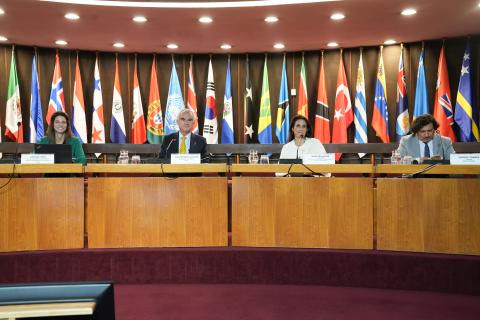Press Release
(14 February 2013) Speaking in Havana today, the Executive Secretary of the Economic Commission for Latin America and the Caribbean (ECLAC), Alicia Bárcena, highlighted the role of planning in the region's development at a seminar to reflect on 50 years since the first Economic Plan in Cuba.
The event, which ends on Friday, was opened on Thursday by Ms. Bárcena, the Minister of Foreign Trade and Foreign Investment (MINCEX) in Cuba, Rodrigo Malmierca, and Vice-President of the Council of Ministers and Minister of Economy and Planning, Adel Yzquierdo. Also in attendance were various authorities from Cuba and other Latin American and Caribbean countries, including Viviana Caro, Minister of Development Planning of the Plurinational State of Bolivia, and Paul Oquist, Minister and Private Secretary for National Policies in Nicaragua.
According to the most senior ECLAC official, who is visiting Cuba from Monday 11 February to Friday 15: "Latin America and the Caribbean is outlining a new development agenda with equality at its heart, and this requires a long-term strategic vision and the establishment of priorities".
In this context, on Wednesday Ms. Bárcena held a meeting with Raúl Castro, President of the Council of State and Council of Ministers of Cuba. At the meeting, which was also attended by Foreign Minister, Bruno Rodríguez, and MINCEX Minister, Rodrigo Malmierca, the Cuban President thanked the Commission for the support it will provide in 2013 to the work of the Community of Latin American and Caribbean States (CELAC), of which Cuba holds the pro tempore presidency.
At the seminar to mark 50 years of planning in Cuba, which was organized by the Government at the National Hotel in Havana, the Executive Secretary emphasized that "planning is an essential instrument for coordinating, implementing and monitoring the structural change strategy proposed by ECLAC to make progress towards development with equality in Latin America and the Caribbean".
The seminar was also attended by the Director of the ECLAC Latin American and Caribbean Institute for Economic and Social Planning (ILPES), Jorge Máttar, who have a presentation on current trends in planning theory and practice. Juan Tomás Monegro, Vice-Minister for Planning in the Dominican Republic, then provided comments on that presentation.
ILPES, which has spent 50 years supporting the region's countries with studies, assistance and training, is carrying out a consultation and debate with planning ministries and authorities in Latin America and the Caribbean, with a view to gathering empirical evidence on practice and challenges in the sector, as well as helping to achieve national and regional development objectives.
The Ministerial Planning Dialogues began on 22 November 2012 in Brasilia at the seminar "Planning and development: international experiences and the case of Brazil", which was jointly organized by Brazil's Ministry of Planning, Budget and Management and ECLAC (through ILPES).
In addition, the Regional Council for Planning (which provides strategic guidelines for the work of ILPES) is scheduled to meet at the end of the year in Brazil. The Council is a ministerial forum for dialogue, exchange of experiences and discussion on planning practice trends.
According to the ECLAC Executive Secretary, planning for development should be a comprehensive, organized and participatory government process to determine the courses of action that a country should undertake to achieve medium- and long-term objectives.
She concluded that a 21st-century planning process should include, for instance, capacity for coordination among various levels of territorial government, production sectors and public and private actors, as well as a constant effort of assessment, monitoring and feedback in terms of public policy outcomes.
Any queries should be sent to the ECLAC Public Information and Web Services Section.
E-mail: prensa@cepal.org; Telephone: (56 2) 2210 2040.
Follow us on: Twitter, Facebook, Flickr and YouTube.



